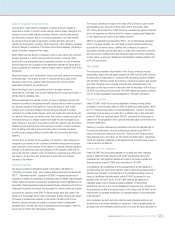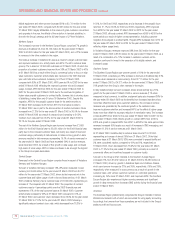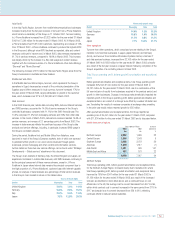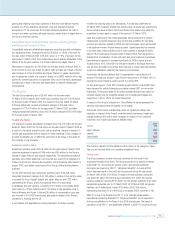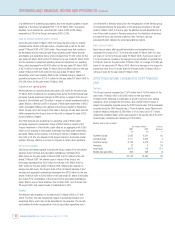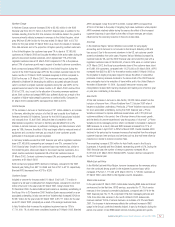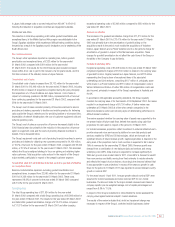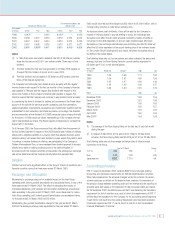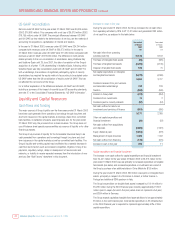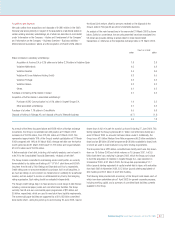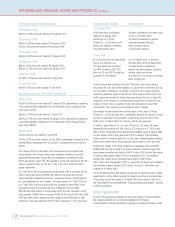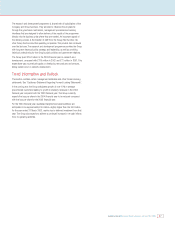Vodafone 2003 Annual Report Download - page 39
Download and view the complete annual report
Please find page 39 of the 2003 Vodafone annual report below. You can navigate through the pages in the report by either clicking on the pages listed below, or by using the keyword search tool below to find specific information within the annual report.
Vodafone Group Plc Annual Report & Accounts and Form 20-F 2003 37
Northern Europe
In Northern Europe, turnover increased 20% to £5,432 million in the 2002
financial year from £4,511 million in the 2001 financial year. In addition to the
increase resulting from the first time inclusion of Vodafone Ireland, the growth in
turnover primarily reflects increases in revenues in the United Kingdom, which
grew 9% from £3,444 million for the year ended 31 March 2001 to £3,763
million for the year ended 31 March 2002, as a result of increases in revenues
from data services and in the proportion of higher spending contract customers.
In the United Kingdom, the customer base grew 7% to stand at 13,186,000
customers at 31 March 2002 and includes the effect of the action taken during the
period to disconnect inactive customers, which represented 11% of the total
registered customer base at 31 March 2002 compared to 12% in the previous
period. 79% of customer growth was in respect of contract customer connections.
Both contract and prepaid ARPU stabilised in the United Kingdom during the
course of the 2002 financial year. ARPU for the contract customer base for the
twelve months to 31 March 2002 increased marginally to £555 compared to
£550 for the year to 31 March 2001. This movement was in part favourably
affected by Vodafone UK developing the ability to accurately allocate inbound
calls to contract or prepaid customer segments during the year. ARPU for the
prepaid customer base for the twelve months to 31 March 2002 declined from
£156 to £118, due, in part, to the allocation of incoming revenues explained
above. Both contract and prepaid ARPU also suffered dilution as a result of the
migration of higher-value prepaid customers to contract tariffs. Compared to
31 March 2001, blended ARPU decreased from £306 to £276.
Central Europe
Of the increase in turnover in Central Europe, £107 million relates to an increase
in Germany, reflecting the inclusion of a first full year’s results from Vodafone
Germany (formerly D2 Vodafone). Turnover for the 2001 financial year included
only amounts from 12 April 2000, being the date of completion of the
Mannesmann acquisition. Turnover in Germany also benefited from a 5%
increase in service revenues, in particular, messaging and data revenues, which
grew by 18%. However, the effect of this was largely offset by reduced levels of
equipment and connection revenues as a result of lower customer growth,
particularly in the prepaid customer segment.
In Germany, Vodafone ended the 2002 financial year with a registered customer
base of 21,489,000, representing an increase of over 2%, compared to the
2001 financial year. Growth in the customer base was restricted as, similar to
the United Kingdom, steps were taken to disconnect inactive customers. As a
result, inactive customers represented 9% of the total customer base at
31 March 2002. Contract customers increased 9% and represented 43% of total
customers at 31 March 2002.
Both contract and prepaid ARPU declined in Germany, compared to the 2001
financial year, falling from 1611 to 1559 and from 1151 to 1110, respectively.
Blended ARPU decreased from 1378 to 1298.
Southern Europe
Included in turnover for the year ended 31 March 2002 is £1,770 million in
respect of a full year’s contribution from Vodafone Spain, compared to only £444
million of turnover in the year ended 31 March 2001, being turnover from
29 December 2000, the date Vodafone Spain became a subsidiary undertaking of
the Group. Prior to 29 December 2000, Vodafone Spain was accounted for as an
associated undertaking. In Italy, turnover from Vodafone Italy increased 25% from
£2,967 million for the year ended 31 March 2001 to £3,711 million for the year
ended 31 March 2002, principally as a result of the enlarged customer base.
In Italy, Vodafone Italy increased its registered customer base by 13% to
17,711,000, 7% of which were considered inactive at 31 March 2002. Blended
ARPU decreased in Italy from 1378 to 1345. Contract ARPU increased from
1756 to 1769 due to the policy of targeting high value customers, while prepaid
ARPU remained relatively stable during the year as the effect of the increased
customer base was in part offset by the effect of lower revenues per minute,
influenced by the voluntary reduction in fixed-to-mobile rates.
Americas
In the Americas Region, Verizon Wireless is accounted for using equity
accounting and its turnover is not included in the Group’s statutory profit and
loss account. Due to the economic slowdown in the US, net customer growth
slowed considerably from prior years. However, Verizon Wireless increased its
customer base by 9% over the 2002 financial year, and ended the year with a
registered customer base of 29,585,000, of whom 94% were on contract plans.
At 31 March 2002, the Group’s proportionate share of the customer base stood
at 13,081,000 customers, compared with 11,570,000 at 31 March 2001. ARPU
increased from $551 to $576 for the twelve months ended 31 March 2002 as
the migration to digital price plans helped to reduce the effect of competitive
pressures. Roaming revenues declined in the second half of the 2002 financial
year, principally due to the reduction of travel within and to the United States in
the wake of September 11, 2001. Successful intercarrier roaming rate
renegotiations reduced both roaming revenues and roaming cost of service year
on year, also contributing to the decline.
Asia Pacific
Of the total increase in turnover in Asia Pacific, £3,323 million arises from the
inclusion of turnover from J-Phone Vodafone from 12 October 2001 when it
became a subsidiary undertaking. Previously, J-Phone Vodafone was accounted
for as an associated undertaking. During the 2002 financial year, J-Phone
Vodafone continued to capture additional market share, with 2,219,000 net
customer additions in the period. One of the key drivers of the recent growth,
and the levels of turnover experienced, was the success of “sha-mail”, J-Phone
Vodafone’s photo-messaging service which contributed to increases in data and
SMS revenues. As a result, data and SMS revenues increased from 11% of
service revenues in April 2001 to 20% for March 2002. Overall, blended ARPU
declined in the period as the increased revenues that resulted from the enlarged
customer base and new products and services such as sha-mail were offset by
reductions in mobile to mobile connection fees.
The remaining increase of £36 million for Asia Pacific arose in the Group’s
businesses in Australia and New Zealand, representing growth of 5%. During the
2002 financial year, the number of venture customers increased 8% to
3,241,000 at 31 March 2002. Blended ARPU, however, declined compared to
the 2001 financial year.
Middle East and Africa
In the Middle East and Africa Region, turnover decreased as the revenues arising
from the continued strong growth in the registered customer base, which
increased 47% from 1,171,000 at 31 March 2001 to 1,718,000 customers at
31 March 2002, were offset by the Egyptian pound’s devaluation.
Mobile data revenues
In the year ended 31 March 2002, mobile data, including SMS, data and Internet
services and, for the first time, GPRS services, accounted for 11.1% of service
revenues in the Company’s controlled subsidiaries, compared with 8.1% for the
2001 financial year. The 11.1% comprised 9.5% from messaging services and
1.6% from other data services. In the month of March 2002, data service
revenues reached 13.5% of service revenues, an increase of 4.2% over March
2001. The increase in data revenues reflects the continued increase in SMS
usage in the Group’s controlled networks helped, in part, by the launch during the
period of a number of new SMS-based services including games and quizzes.




